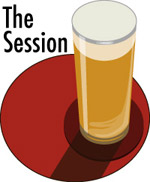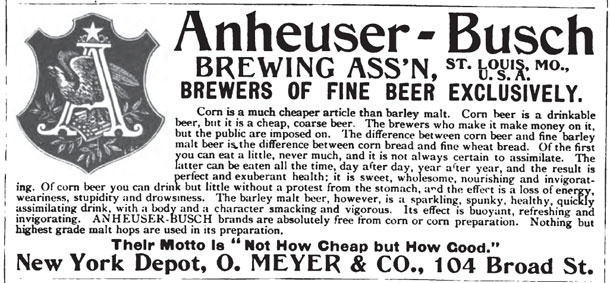MONDAY BEER LINKS WILL RESUME 1.11.16
Or 11.1.16 depending on what calendar language you speak.
Feel free to lean on #BeeryLongreads and Boak & Bailey’s Saturday roundups in the interim.
Or 11.1.16 depending on what calendar language you speak.
Feel free to lean on #BeeryLongreads and Boak & Bailey’s Saturday roundups in the interim.
 Dan Conley at Community Beer Works has announced the topic for The Session N. 107: Are breweries your friends?
Dan Conley at Community Beer Works has announced the topic for The Session N. 107: Are breweries your friends?
To be in business nowadays you pretty much have to have a social media presence. This is especially true in the beer world, where some breweries have basically built themselves on their personality. And yet, at the end of the day, we’re also selling you something.
I believe this is the first Session to be hosted by a brewery rather than beer blogger. How do you feel about that? Do you want your feeds clear of businesses, or do you like when a brewery engages with people? Can you think of anyone who does it particularly well, or poorly? As the person who does our social media, which I think is very good (although not quite good enough), I struggle with this problem. I’m on both sides, and rather than come to any sort of conclusion of my own I thought I would make all of you write about it.
This actually isn’t the first session hosted by a brewery. Nico Freccia and Shaun O’Sullivan at 21st Amendment played host for No. 22 seven years ago. The topics was: “What does the repeal of Prohibition mean to you? How will you celebrate your right to drink beer?” However, this is the first session hosted by a brewery on Jan. 1.
Craft beer – have the big brewers nailed it?
[Via Morning Advertiser]
Gerrymandering the Beer Aisle.
[Via Literature and Libation]
ABInBev Doesn’t Hate You – It Just Wants Sales.
[Via A Good Beer Blog]
There’s some big concept thinking going on in these three links, too big for me to summarize succinctly. I suggest reading them in order. Knowing that you may not, here are the last paragraphs of each one, unfairly presented without context.
I can see why this might cause some consternation for craft brewers and their hardcore fans, for whom craft is a movement, a stand against the corporate dominance of everything. But from a drinker’s point of view, if the big guys are now making better beer, that has to be good news.
As a fine patina sets in and the youthful exuberance fades, I have a sneaking suspicion that the game of beers will start to look a lot less like a righteous war or crusade, and a lot more like the classic Red vs Blue, mudslinging, carpetbagging mess that is our political system. Such is the nature of modern capitalism, and probably why, as they say on the internet, “we can’t have nice things.”
In 2016 as more and more big craft sells out to big beer, organized independent craft will need to catch up with the politics of adapting to market demand, catch up with big beer if it wants to avoid being a blip in history. And it might take as brazen an approach as big beer took in 2015. Not sure craft has what it takes.
The thing about big picture thinking is figuring out where all the little pictures fit in. When the number of breweries in the country doubles in such a short amount of time it is hard to take the pulse of all the new participants. Maybe they are lying, but an awful lot of these people seem to have no interest in becoming the next Golden Road or Ballast Point. They want to make a comfortable living. Some would simply consider themselves brewers, other artisans, some even artists.
Ian Rankin on the perfect pub: The Rebus author tells how pub culture has inspired his novels.
A different sort of little picture. [Via Independent]
Hop tidbit of the week
Oooooo…look at that: pic.twitter.com/9FeOey2E9i
— Ed Wray (@TheBeerFather) December 2, 2015
The conversation started the week before, but continued last week (click on the date to see it all), among other things raising questions about where Fuggle fits in on any hop family tree. The chart pictured also appeared in “For the Love of Hops” and shows the results of molecular studies that indicate the distance between certain varieties. The scientists used AFLP fingerprinting.
Researchers at the University of Hohenheim in Stuttgart employed that same technology to analyze the similarity of Tettnanger hop plants to other varieties in 2002, reaffirming other surveys that concluded that Tettnanger, Spalt Spalter, and Saaz hops are so closely related they may be grouped together as “Saazer hops.”
Among the hops studied at Stuttgart where multiple Osvald Saaz clones, plants chosen from the field because they looked and smelled like the original Saaz, and brewed similar beer, but perhaps yielded more cones per plant or were more disease resistant. Various farmers grew and sold these varieties as Saaz, and happy customers brewed with them as Saaz.
All the Osvald Saaz clones studied at Stuttgart could be more clearly distinguished from each other than the original Saaz could from Tettnanger and Spalter. Three of the clones were quite similar to the landrace Saaz, but Osvald clone 126 was much closer to Fuggle. Nonetheless, all Osvald clones grown in the region around Žatek exhibited very similar morphological traits and aroma components.
Just to be clear, grown in Žatek a plant genetically closer to Fuggle than Saaz passed for Saaz.
New words will remain scarce at this url until I’m done sorting out which non-traditional beer ingredients might kill you. Did you know salicin, the active ingredient in willow bark, might have contributed to the death of Ludwig von Beethoven?
Session 106: Christmas Ales Through The Bloggy Years.
I was absent from The Session, shame on me. But I look forward to reading the recap. [Via A Good Beer Blog]
There Are Almost No Black People Brewing Craft Beer. Here’s Why.
“Does it even matter?” Yes. [Via Thrillist]
What Is ‘Drinkability’?
[Via Boak & Bailey]
Drinkability.
[Via Ed’s Beer Site]
The Science of Drinkability.
[Via Ed’s Beer Site]
An Anheuser-Busch campaign back in the day that put the word “drinkability” on billboards did not endear the word to those who would protect the world from bland beers. It may still take rehabilitating, even though it was more than 10 years ago. So before, I think, it was used by that Brazilian doctoral candidate. I’m certain of that because when I was doing the reporting for “Brew Like a Monk” and heard Hedwig Nevin, brewing director at Duvel, use the word digestibility I shook my head to clear my ears. It was a revelation.
The Dirty Secret about ‘Clean’ Plants.
The devil is in the details. [Via Gorst Valley’s Hop Grower’s Blog]
Is the Story More Important than the Wine?
As a consumer my interest in “the story” is different than being fed “romantic back story.” [Via Wine Spectator]
Proposed San Diego County law could change the meaning of ‘local’ wine.
Next up local beer? [Via Los Angeles Times]
This is most of the conversation that started a while back, went dormant, then resumed last week. Click on the 5:10 a.m. link to open it up.
@Thirsty_Pilgrim Thinking about it, Zoigl must be a descendant of German farmhouse ale. Now turned into pils, but earlier very different.
— Lars Marius Garshol (@larsga) November 12, 2015

From Puck Magazine, Feb. 22, 1893